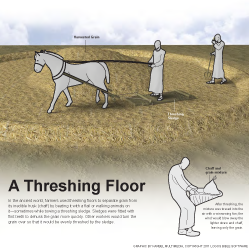20:1 Wine is a mocker Warns against the over consumption of alcohol. Drunkenness should be avoided because it causes strife—a theme expounded upon in 23:29–35.
Drunkenness should be avoided because it causes strife—a theme expounded upon in 23:29–35.
20:2 is the dreaded anger of a king Guarding against the king’s anger is a recurring theme in Proverbs. Compare 16:14; 19:12.
20:4 The lazy person will not plow in season See 6:9 and note; 13:4 and note.
20:8 winnows Kings were responsible for judging legal disputes (1 Kgs 3:16–28).
20:9 I have made my heart clean The rhetorical questions in this proverb illustrate that no one is completely guiltless (1 Kgs 8:46; Psa 143:2; Job 4:17–19).
20:10 Stone and stone, measure and measure Dishonest merchants would often use faulty scales and weights to cheat their customers. See note on Prov 11:1.
20:11 Even by his acts, a young man will make himself known This phrase is ambiguous. Either the child pretends to be good but really is not, or the child’s actions will indicate how he or she will act as an adult.
20:12 The ear that hears and the eye that sees Indicates perceptive listening and seeing, not just sensory ability.
20:13 Do not love sleep Laziness is condemned as a path to poverty (6:9–11; 19:15; 20:4).
20:14 Bad, bad,” the buyer will say Describes a negotiating tactic: A buyer claims a deal is no good to get a lower price, then the buyer boasts about the great deal that has been secured. It is unclear whether this proverb condemns this practice or merely reflects upon it.
20:15 precious jewels are lips of knowledge Wisdom is better than precious stones, gold, and silver (3:14–15; 16:16; Job 28:15–19).
20:16 Take his garment Advocates holding people responsible for their obligations. Proverbs earlier warned against putting up security for others to avoid becoming responsible if they defaulted (see Prov 6:1 and note).
20:17 mouth will be filled with gravel Highlights the ultimate reward of deceit: Its gain may be sweet, but it is fleeting.
20:18 with guidance make war Rather than encouraging war, this proverb reflects the reality of war and prescribes the proper way to wage it (compare Prov 20:3). A careful and wise leader will be more successful in war than a powerful but reckless one (24:5–6; Eccl 9:13–18).
20:19 babbler’s Describes those who speak too much and talk foolishly about things they should not. Unlike the slanderer, the simple babbler may not be malicious.
20:20 He who curses his father and his mother This refers to acting contemptuously (Prov 30:11, 17; compare Exod 21:17; Lev 20:9).
20:22 wait for Yahweh Encourages people to patiently trust in Yahweh instead of taking matters into their own hands. David exemplified this patience in his situation with Saul (1 Sam 26:8–11).
 Topics in Proverbs Table
Topics in Proverbs Table
20:24 Away from Yahweh are the steps of a strong man People are responsible for their own actions, but Yahweh is ultimately over all of human life and has His own plans that cannot be thwarted (compare Prov 16:9).
20:25 after vows, to scrutinize While the law did not require making vows, it considered leaving a vow unfulfilled a serious offense (Num 30:2; Deut 23:21–23). The author of Ecclesiastes warns against making a rash vow, arguing it is better to refrain from making them (see Eccl 5:4–6 and note).
it considered leaving a vow unfulfilled a serious offense (Num 30:2; Deut 23:21–23). The author of Ecclesiastes warns against making a rash vow, arguing it is better to refrain from making them (see Eccl 5:4–6 and note).
20:26 he will drive a wheel over them Grain could be threshed by rolling a wheel over it to crack the husk. Here it signifies the king’s ability to identify and remove evil from society.
20:29 the beauty of the aged In the ancient Near East, old age was a sign of wisdom (Job 12:12; 32:6–7); in Israel, old age was also considered a sign of God’s favor or a reward for obedience (Gen 15:15; Deut 30:19–20).

|
About Faithlife Study BibleFaithlife Study Bible (FSB) is your guide to the ancient world of the Old and New Testaments, with study notes and articles that draw from a wide range of academic research. FSB helps you learn how to think about interpretation methods and issues so that you can gain a deeper understanding of the text. |
| Copyright |
Copyright 2012 Logos Bible Software. |
| Support Info | fsb |
 Loading…
Loading…


